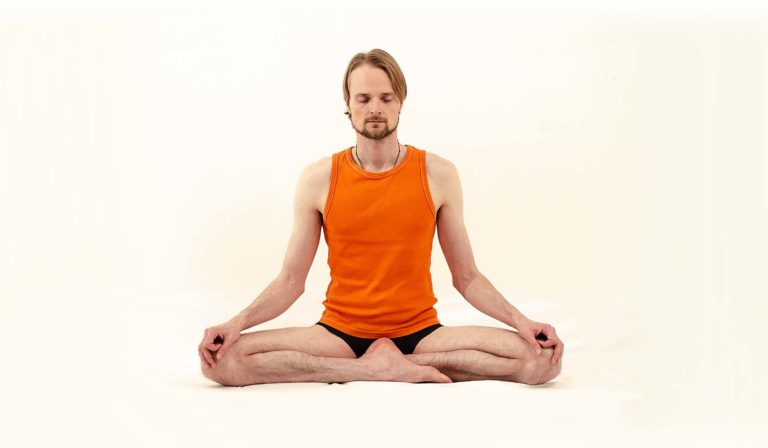Dozing off while meditating can be both frustrating, embarrassing and demotivating. When you take time off to work with yourself, and you end up napping, it can feel like you are wasting your time. So how to stop falling asleep while meditating? Here are 15 tried and tested strategies to stay awake during meditation. Feel free to use them when needed.
Why falling asleep while meditating is very common
To begin with, I would like to explain that falling asleep during meditation is very common. When I teach people meditation, I see it frequently. During my twenty years as a meditator, I have dozed off while meditating more times than I can count.
This response has to do with meditation activating your parasympathetic nervous system, the part of your nervous system responsible for slowing down, regenerating and healing. If you are suffering from stress, then your nervous system is overly geared towards activity. In that case, you can get an abrupt push in the other direction once you start relaxing.
Another reason is that the brain’s activity during meditation is similar to the one generated during sleep. When you meditate, the frequency of the electrical impulses in your brain changes. One of the things that happen is that slow frequencies standard during deep sleep and dreams become prominent. What you also need to trigger is the so-called alpha frequency that lies between sleep and waking. Thanks to alpha activity, you can remain aware of the profound state you have entered. Without it, you fall asleep.
Change your attitude to sleep and avoid frustration
In this article, I will give you advice on how to stop falling asleep while meditating. I am confident these strategies will improve your ability not to nap during your practice. However, you might still run into this issue occasionally, even if you do all you can to avoid it. To save yourself some annoyance, accept that meditation sometimes is a sleepy experience.
Also keep in mind that although you might not be fully aware while meditating, you will not be fully asleep. At least not most of the time. You will find yourself in this in-between state where you have triggered the relaxation response and where you have altered your brain’s activity. Though you should aim for a fully aware meditation practice, this state is not without benefits.
Now, let’s go on to what you can do to stay awake during meditation.
Tried and tested methods to stay awake while meditating
1. Get enough sleep at night
Before you do anything else, ask yourself why you are falling asleep. Could it be because you are not getting enough night sleep or your sleep quality isn’t good enough? If that is the case, start by improving your sleep hygiene. If you have a problem with insomnia, meditation can be one crucial component in coming to terms with that. But there are many other elements to consider such as exercise, bedtime routine and disturbances. Have a look at this guide on WikiHow if you think that poor sleep hygiene could be the reason you can’t stay awake while meditating.
2. Practice sitting, preferably in a meditation pose
The second thing to do is to check your meditation pose. Meditating lying down is out of the question. It will make you much more likely to fall asleep. Instead, practice in a sitting position with your spine erect. For example, you can sit on a chair or a stool, ideally without leaning on the back of your chair.

If you can sit in a classic meditation pose such as the easy pose (sukhasana) or the diamond pose (vajrasana) that is even better. By using a sitting cushion, most people can learn to sit in these poses. Suppose you can sit in one of the more complicated yoga poses such as the lotus pose or siddhasana. In that case, you will improve your chances of staying awake even more.
3. Make sure you have digested properly
Here comes more essential advice. Did you give yourself the time you needed to digest your last meal? As long as your body is still busy digesting that will contribute to fatique in a big way. Wait at least three hours after a big meal before practising. Besides, consider that certain types of food are heavier to digest than others. It is a good idea to eat light.
4. How to stop falling asleep while meditating by practising regularly
By meditating regularly, you will improve every aspect of your practice, including your ability to stay awake. One reason for this is that you will become a more skilful meditator. Another reason is that your alertness will still be elevated from your last session’s effects when you start your next one. Furthermore, modern research has shown that you gradually rewire your brain thanks to consistent meditation practice. You physically become more apt to accessing the meditative state.
5. Find your optimal time
Depending on your biological rhythm, there are times of the day when you are more energetic than others. There could also be times when you are more prone to drowsiness. Experiment with meditating on different times of the day to determine when you stand the greatest chances of meditating with full awareness. You will be surprised how much difference the time of the day can make.
You might have heard that the morning is the ideal time to meditate and that it is best to avoid meditating in the evening. Don’t let such ideas limit you but find out for yourself what works best for you.
6. Practice in a lit room
Darkness sends signals to your nervous system to calm down and even fall asleep. So if you are asking yourself how to stay awake during meditation, it would be a good idea to practice in a lit room. You could even practice with your eyes open, resting your gaze on the floor in front of you.
7. Mediate in a well-aired, cool room
Air the room where you will practise before starting. Some extra oxygen could give you a welcome boost in staying alert. Furthermore, adjust the room temperature, so that it is cool but not chilly. Additional advice is to dress light, keep your feet bare and not to cover your head.
In contrast, if you make yourself comfortable by bolstering yourself up, it will contribute to you dozing off.
8. Practice yoga poses and breathing exercises before meditating
Yoga poses and yogic breathing exercises are excellent preparation for meditation. Practising such techniques right before sitting down for meditation has a tangible effect on your meditation. You will not only be calmer but also bring more energy and clarity into your practice. It will be a lot easier to stay awake.
Here on Forceful Tranquility, I guide long yoga and meditation sessions. One of the many advantages of my lengthy sessions is that staying awake during meditation is more effortless. I typically place the meditations at the end of the classes. Then you have already prepared yourself during one and a half hour or more with a host of other techniques.
9. Physical activity makes you sleep better at night
Moderate aerobic exercise, such as walking, impacts our night sleep positively. With better night sleep, you lower the risk of dozing at other times.
If you are determined to stop falling asleep while meditating you can experiment with more vigorous exercise just before practising. Such exercise releases endorphins. These chemicals can create an activity in your brain that keeps you awake.
10. Start your meditation session with a relaxation technique
Before your sitting meditation practice, you could do an additional lying down relaxation, such as Yoga Nidra. Even if you fall asleep during the relaxation, you will have extra energy afterwards to help you go through with your meditation with full awareness.
11. Make your meditations lengthy
Another measure you could try is to prolong your meditations. You might find that even though you doze off early on, your meditation will be long enough for you to wake up and continue fully awake.
In general longer meditations give you better your results.
12. Change your diet
What you eat has a massive impact on your general health on how energetic you are. Cutting down on sugar and fast carbohydrates is a quick win. A healthy and balanced diet increases your energy level and decreases your need for sleep. When your body does not have to work hard to deal with the consequences of an unhealthy diet, you have more power left over for other things.

13. Still falling asleep while meditating? – Try a different method
There are different meditations with different effects. If falling asleep while meditating is an issue you want to resolve then try tratak. It is a concentration method during which you fix your gaze in the flame of a candle. Your eyes are open during most of the practice, and the candle’s light will stimulate your brain to stay more alert. As a bonus, many practitioners say that practising tratak before bedtime gives a good night sleep.
14. Practice with a guide
If your usual meditation method is silent practice with a monotonous technique, you could try a more complex guided meditation. One such meditation is Antar Muna. Following the instructions of a guide can give you good advice during your meditation, keep you on track and even wake you up should you fall alseep.
Guided meditations are best done live. But many teachers also offer recorded meditations, just as I do on this website. Practising with a recording has advantages. For example, you can get easy access to highly qualified teachers. You don’t lose your time in transports, and you can choose your practice time according to your optimal biological rhythm.
15. Practice with others
Joining a meditation group can be very inspirational. Practising with others can help you with regularity which will, in turn, make you less prone to sleep. You can also get good advice from more experienced meditators that can help you improve. But above all, when you meditate in a group, you benefit from the group’s energy field. Experienced meditators know that meditating in a group can make your sessions considerably more powerful.
Conclusion
There you go, now you know how to stop falling asleep while meditating. To see results, I advise you to first look at your situation closely. For some people just implementing one of these bits of advice can have a dramatic effect. However, most of us need to work with several strategies to see notable results.




